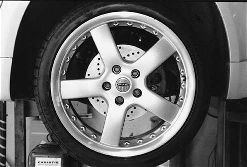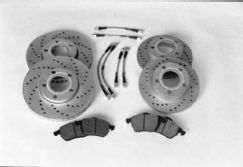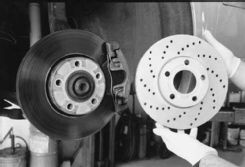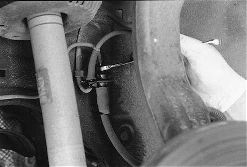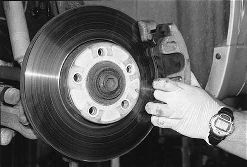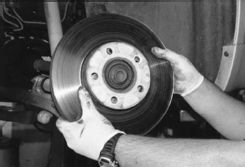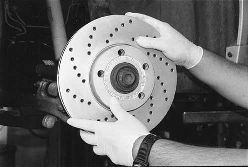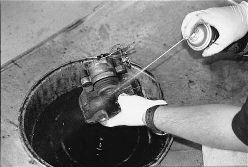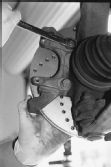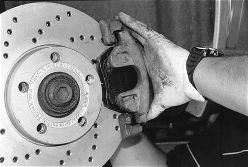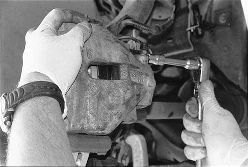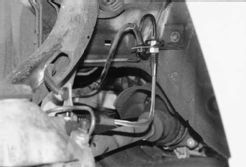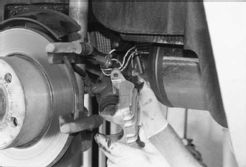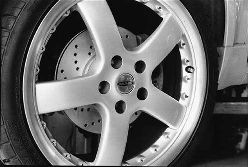Okay, we don't want to mislead you. We are not talking about a big Brembo brake kit with oversized rotors and four-piston calipers. The system we're discussing offers improved street performance using Brembo parts and is available for current generation Passats (and Audi A4s) for less than $1,000. Online parts retailer Drivewire.com is working with Race Technologies, the master distributor for Brembo's high-performance program, to offer the system. It's not technically a "kit," since it's really a combination of components that can be purchased individually. "Think of braking improvements the way you do engine upgrades to gain horsepower," said Jaime Trimble, co-founder of Race Technologies.
"You may do a number of things to an engine to gain a few horsepower here, a few more there, towards a cumulative improvement. It's the same with these brake parts. Each component serves a different function, and they work together for a cumulative effect." Overall, the system is designed to offer firmer pedal response and repeatable brake performance without fade, even after a number of hard stops. If you upgrade your braking system with all the components shown here, your Passat will be ready for autocross action. Or, if your braking needs (and budget) are less aggressive, you can still improve your street braking performance by choosing a few key parts.
The system starts with vented, cross-drilled rotors for all four corners. They are the same size as the OE rotors (11 inches front, 9.6 rear), but the cross drilling improves heat dissipation. "The heat on the surface of the rotor exits through the holes, so the cross-drilled brakes will run 90 degrees cooler on average," Trimble explained. Cooler brakes are less prone to fade, and cooler rotors are also less prone to warpage. One concern voiced about drilled rotors is a tendency towards cracking. Brembo is careful about the pattern it uses to drill the holes. They're not too close to each other, or to the internal vanes, so as not to weaken the rotor. Brembo also chamfers all the holes in the rotor to relieve the potential stress areas that a sharp edge could create. As you might imagine, the rotors are the costliest part of the system. Drivewire.com's retail price is $590 for the set of four.
Next in the system are braided stainless brake lines. These replace the rubber hoses that run to the caliper from the hardline mounted on the inner fender. Under hard braking conditions or a panic-type stop, the OE rubber lines can expand, according to Trimble, and not deliver full fluid pressure to the caliper. Braided stainless lines cannot expand, thereby delivering consistent fluid pressure no matter what the braking conditions are. The stainless lines are also not susceptible to kinking or puncture like the rubber hoses.
Drivewire.com's price for the four stainless lines is $119. Now to the brake pads. The Race Technologies system uses a pad that fits in the OE caliper, which keeps costs down considerably. The ferro-carbon pads will not glaze, Trimble said, even under hard braking, and will deliver repeatable stops time after time. Only the front pads are replaced in this system because of the braking bias VW built into the Passat. "The bias is 80-percent front, 20 rear," Trimble told us, "so there's really not enough force exerted back there for pad replacement to be effective." In fact, if there's no Pro Solo competition in your Passat's future, you might leave the pads off your shopping list, since the other upgrades will deliver tangible improvements on the street. The pads retail for $89. Finally, Trimble recommends replacing the brake fluid with a synthetic, non-silicone-based fluid. Race Technologies uses Motul 5.1. The synthetic fluid runs cooler than traditional fluid, which helps eliminate spongy pedal feel under hard braking. "Plus, silicone can eat rubber seals," Trimble said. "It's okay for race cars to run silicone-based fluid, since their master cylinders are replaced after every two races or so. But you don't do that on the street." The Motul 5.1 retails for $12 per bottle, and Trimble estimates about three will be needed for the full system.
And there you have it. Rotors, pads, lines, and fluid give you a complete brake system upgrade for $834. Take out the pads, and your cost goes down to $745. Not a bad investment, considering how important your brakes are. If you’re the type who needs the best of everything, you could go far beyond the brake components shown here. Brembo offers a Passat/A4 kit with 13-inch, two-piece rotors and four-piston calipers that’ll set you back about $2,100. Or if that’s not big enough for you, Race Technologies has R&D facilities and engineers on staff who can custom-build a system for just about any braking application, right up to full-race package with 15-inch rotors and eight-piston calipers.
To show you how this more moderate system is installed, we photographed the process on a '99 Passat at one of our favorite L.A.-area shops, TRS/Group4, where Walter Portillo did the wrenching. The photos illustrate the replacement of the brake parts on the front left corner. To complete the job, you basically repeat the same steps at the other three corners, fill the fluid reservoir, and bleed the brakes. There is one extra step necessary with the rear brakes because of the handbrake cable, and that's explained in the photo captions. Portillo made the job look easy enough for any handy driveway do-it-yourselfer to tackle, but he offered this word of caution: Since you are working on the brake system, a mistake could be very costly and not just in terms of dollars. You want to make sure every procedure is done properly. If you have any doubts as to your abilities with a wrench, it's best to have a pro do the work.

